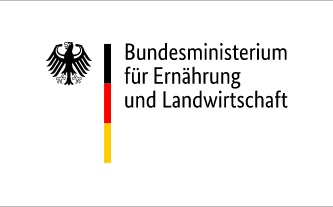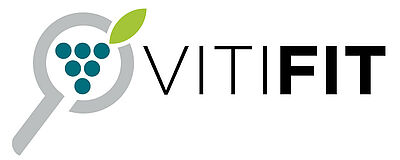VitiFIT - Healthy vines
in organic viticulture through research, innovation and transfer
Project duration: August 2019 to December 2025
Funded by the Federal Program for Organic Farming and Other Forms of Sustainability Agriculture
Contact - Sub-project resistant grape varieties and plant protection, Rural Area Service Center (DLR) Rhenish Palatinate:
- Dorottya Agnes Simon - DorottyaAgnes.Simon☞ Please insert an @ at this point ☜dlr.rlp☞ Please insert a period at this point ☜de
Prof. Dr. Jochen Bogs - jochen.bogs☞ Please insert an @ at this point ☜dlr.rlp☞ Please insert a period at this point ☜de
In viticulture, the massive occurrence of downy mildew can lead to considerable yield losses and quality losses for organic winegrowing operations, sometimes threatening their very existence. In organic viticulture, copper-containing plant protection products are currently the only effective and approved option for combating grapevine peronospora. Other preparations permitted under current EU law have not yet shown sufficient effectiveness. In general, a maximum of 6 kg pure copper/ha and year may be applied in the EU (EUCOM, 2008), whereby only 3 kg pure copper/ha and year are permitted in Germany. It is not yet possible to completely dispense with copper preparations in viticulture, as this can result in yield losses of 50-100% (Eisenmann 2017). Against the background of the discussed risks of using copper as a plant protection product and the resulting uncertain prospects for the approval of copper products in viticulture, the use of copper should be minimized, especially in organic viticulture. As no alternative, biological plant protection products are yet available that could replace copper, the project aims to develop and test combined, holistic plant protection strategies for the sustainable and environmentally friendly control of downy mildew on grapevines while at the same time reducing the use of copper in organic viticulture. To this end, direct measures such as the use and development of new biological plant strengthening agents are to be implemented and their potential for reducing the number of copper treatments and copper concentrations evaluated. At the same time, these direct measures are to be combined with indirect approaches such as the cultivation of fungus-resistant grape varieties and cultivation technology measures in practical trials in order to minimize the risk of downy mildew infestation and at the same time secure the yield of the farms.
In addition to the Wine Campus Neustadt and the Rural Area Service Center (DLR) Rhenish Palatinate, the DLR Rheinhessen-Nahe-Hunsrück, Geisenheim University, the University of Erlangen-Nuremberg, the Julius Kühn Institute in Siebeldingen, the Viticulture Institute Freiburg and the Bavarian State Institute for Viticulture and Horticulture in Veitshöchheim are involved in the project. The organic associations Bioland, Demeter, ECOVIN and Naturland are also important partners in the network due to their proximity to practical applications.

Dorottya Agnes Simon

Prof. Dr. Jochen Bogs
PIWI brochure



